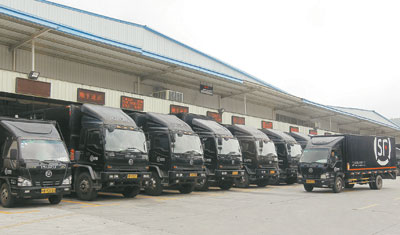
DIESEL has found an unexpected ally in the growing legion of delivery trucks spawned by China’s rapidly expanding e-commerce, forestalling any drop in the country’s consumption of the fuel as the economy shifts its focus away from manufacturing.
In a sign of China’s migration to a services-based economy from an industrial powerhouse, its demand for diesel used to power machinery and fuel trucks, as well as generate electricity, has been flat this year.
That economic restructuring has led to predictions China’s diesel consumption will peak soon. But with e-commerce delivery trucks picking up some of the slack, diesel use is now seen growing slightly until 2020.
“China’s soaring e-commerce growth has spurred a surprise strength in diesel demand this year, offsetting continuing weakness from the industrial and manufacturing sector,” said analyst Gordon Kwan of Nomura research.
China’s e-commerce market has overtaken that of the United States as the world’s largest and is seen expanding nearly 25 percent a year to 4.5 trillion yuan (US$726 billion) by the end of 2017, according to iResearch, a Chinese Internet research firm.
The country is home to the world’s biggest e-commerce company, Alibaba Group Holding Ltd., which handles more online commerce than Amazon.com Inc. and eBay Inc. combined.
To cash in on the growing demand for delivery vehicles, China’s e-commerce logistic and transport service providers have increased their fleet of trucks. Yuantong Express, among the top four in the sector, added 300 trucks in 2014 and now owns a total of 3,000, most of which run on diesel.
The firm expects its shipments to jump to 30-40 million packages during the massive online shopping sale on Singles’ Day, a Nov. 11 Chinese response to Valentine’s Day, from 25 million on the same day a year ago.
A regional logistics hub of JD.com Inc. — China’s No.2 e-commerce company — has also been expanding its truck fleet, up more than threefold over two years with a target to own a total of 1,000 trucks next year, said a Sinopec fuel marketing official, who closely follows key clients including e-commerce logistics firms.
A JD.com spokesman could not confirm the figure but said the company’s total sales value had quadrupled in the past two years.
As more people shop online, diesel use in the world’s No.2 economy will grow, though only slightly, sources said.(SD-Agencies)
|

